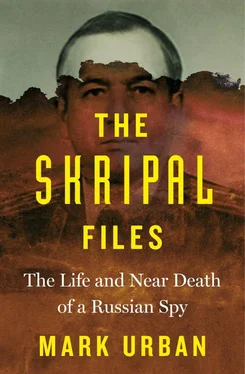Although the foreign-intelligence arm of the KGB contained quite different, and altogether better-educated, people than the bruisers who dealt with domestic dissent, there were many Soviet citizens who could never quite disentangle them. The army, and even the GRU, by contrast, were among the victims of the Great Terror of the 1930s, they were not its executioners. Those entering the world of military intelligence soon learned that it took a particular pride in the fact that it had no KGB ‘special department’, it was to a great extent trusted by the party to carry out its secret work. The GRU was, in Soviet terms, the frame of reference in which Sergei and Liudmila grew up, a very respectable form of espionage.
KGB people had their own view of this relationship of course, noting that they vetted applicants for military intelligence, and if significant evidence emerged that some GRU man might be guilty of espionage, their interrogators would soon move it. Vladimir Kuzichkin, a KGB officer who defected to the UK in 1971, and whose views were influential in MI6 because he spoke to its officers about their targets for recruitment, summed up the relationship:
The GRU hates the KGB, the KGB has no similar feeling towards its ‘distant neighbours’ as the GRU is codenamed in KGB documents. The KGB adopts a condescending attitude to the GRU… it is roughly as an older man might relate to one of fiery temperament who still has much to learn.
That was certainly true of Skripal as he made the journey from his garrison in Uzbekistan to the glamour and sophistication of the capital. He was engaged in something new and immensely exciting – heroic, in his terms, but also honourable in that it did not involve selling himself to the KGB. The process for becoming a GRU operative was neither quick nor without jeopardy. In the first place you had to be invited to take the exam, as Skripal had been in Fergana. If you passed, you went to Moscow, where a whole manner of additional hurdles would have to be cleared before you would even be considered for a posting overseas.
In order to prepare him for tasks as an intelligence officer, Skripal had to undergo another sustained period of professional training, four years of study at an institution called the Military-Diplomatic Academy, on Moscow’s Narodnogo Opolcheniya, or People’s Militia Street. At the end of the 1970s, when Skripal was summoned there, this establishment and indeed the entire GRU were cloaked in mystery – and a good deal of fear. Officers did not apply, for doing so might trigger uncomfortable questions about how they knew about the academy or the wider organization. Instead suitable candidates were invited to put their names forward. The organization drew people from across the full breadth of the armed forces, from air-defence fighter-controllers to paratroopers, or officers on submarines. Having engaged in secret operations in China and Afghanistan, the invitation to take the mysterious exam probably came as less of a surprise to Skripal than to many.
Vladimir Rezun, writing as Viktor Suvorov, explained the manner of an army officer’s arrival at the Military-Diplomatic Academy, his own elevation to the mysteries of the GRU occurring several years ahead of Skripal: ‘immediately you will find yourself in Moscow, with a permanent residence permit… it is as if you had moved onto a higher sphere, as if you and your relations had suddenly been ennobled’.
For Sergei and Liudmila Skripal this elevation to the higher strata of Soviet military society meant a radical change to their lives. After a childhood in Kaliningrad and years in kommunalkas, flats shared with other young families in the Far East or Central Asia, they would find themselves (some years into his new assignment) in their own place in Krilatskoye, a Moscow suburb springing up a few kilometres to the west of the academy where hundreds of flats were set aside for GRU and other army officers. As Sasha neared school age they knew he would be able to go to a good one nearby, and that Sergei’s access to special stores reserved for intelligence officers would allow them to taste the good things in life.
In return for this entrée into the world of Soviet privilege, it was his task to devote himself to study for at least four years. If it went well there was a further incentive at the end: the possibility of a posting overseas, an exotic life neither he nor Liudmila could have dreamt of growing up in bomb-shattered Kaliningrad.
The curriculum at the Military-Diplomatic Academy principally prepared its students to operate as intelligence officers, recruiting and running agents overseas. They learnt the full gamut of espionage techniques, from the ancient ones such as secret writing using invisible inks to encoding messages with one-time pads, running counter-surveillance, and how the typical GRU mission house or rezidentura operated. They had to acquire a good many ‘soft skills’ too, including the art of making polite conversation on the diplomatic circuit, and losing some of those typically Russian traits of dress or manner that might make them stand out in the West.
As for the matter of actually recruiting agents, the students received lectures in the difficulties and arts of successful seduction from some of the GRU’s legends. Vyacheslav Baranov, a fighter pilot whose time at the Military-Diplomatic Academy overlapped with Skripal’s (and whose personal stories would later entwine also), recalled that the instructors said only 10 per cent of officers posted abroad successfully recruited spies, noting, ‘persuading a man to betray his country is usually not an easy thing to do’.
Inductees in the GRU’s training system soon discovered that getting to the academy, something they might have considered a life-changing achievement, was only a waypoint into further phases of selection and recruitment: between those who would get desk jobs or be posted abroad; those who would go to Third World backwaters or important arenas in the East–West espionage war; and those who once in country would never succeed in making a significant recruitment, thus ruining their chances of further foreign postings, and maybe even getting sent home early from their first tour.
One GRU man, summing up this sense that becoming a successful case officer overseas really made one an elite within an elite, quoted a wartime fighter ace who had become a senior officer in the military intelligence organization:
Our intelligence work scarcely differs from air battles. Soviet military intelligence trains thousands of officers and throws them into battle. In real life they are quickly divided into active and passive officers. Some attain glorious heights, while others fade out on their first foreign assignment.
As time at the academy progressed those officers destined to take flight overseas also had to learn how to carry off their specific cover. The GRU exploited diplomatic roles in trade missions and embassies, as indeed did the KGB, but also sent some of its people abroad as ‘employees’ of Aeroflot and Morflot, the Soviet airline and merchant shipping companies, in trade delegation posts or as journalists. The most highly trained of all – often requiring ten or more years of preparation – were ‘illegals’, those sent without official cover of any sort to assume the lives of others in target countries. These were run mainly by the KGB but the GRU also had illegal operations, though theirs were petering out in the late Cold War period.
Skripal had done sufficiently well at the academy to be selected for an overseas diplomatic mission. And as he attended lectures, month after month, year after year, behind the discreet facade of the academy, change seemed slowly to be coming to the Soviet Union. The Moscow Olympics were held – albeit with some political nonsense from the Western powers. Leonid Brezhnev finally keeled over, to be followed as party leader by Yuri Andropov, and then Konstantin Chernenko. It became acceptable even in official circles to allude to the latter Brezhnev period as the ‘age of stagnation’, as the heady growth of the 1950s and 1960s slowed and popular frustrations began to simmer. The West seemed to be forging ahead and many in the Kremlin looked to their spies to help answer the needs of the moment. What were the political, economic, and technological trends of the future? It would be the job of the KGB and GRU to stay ahead of them – whether that was informing the leadership of the war plans of the Reagan presidency or purloining new inventions so that Soviet industry could copy them.
Читать дальше












